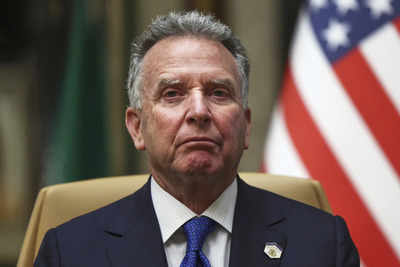US special envoy Steve Witkoff on Sunday said that Hamas might have “duped” him into thinking that they were interested in the bridge proposal for extending the Gaza ceasefire
.
“Well, I certainly hope we get everybody back to the table and get the hostages home. I was. I was in Doha. I met with many of the Arab leaders at the Arab summit. I thought we had an acceptable deal. I even thought we had an approval from Hamas. Maybe that’s just me getting duped. I thought we were there, and evidently, we weren’t,” Witkoff told ‘Fox News Sunday,’ responding to a query about bringing hostages back to home and about the deal during his March 12 visit to Doha.
The proposal aimed to extend the ceasefire through April 19, exchanging five living hostages for Palestinian security prisoners. Israel accepted the terms, offering to free 11 living hostages. However, Hamas maintained its stance on the original agreement’s terms, which was supposed to begin its second phase at the beginning of March.
For a month, though, Israel refused to enter talks on the specific terms of phase two, as the stage’s general framework requires it to fully withdraw from Gaza and agree to a permanent end of the war.
In submitting his bridge proposal earlier this month, Witkoff accepted Israel’s aversion to phase two.
Hamas offered to release one living American-Israeli hostage and the remains of four US-Israeli citizens on March 14, which Witkoff called the response a non-starter. The ceasefire collapsed after two months when Israel resumed military operations four days later.
Witkoff emphasised US support for Israel, stating that Hamas had opportunities for demilitarisation and accepting the bridge proposal for a 40-50 day ceasefire. He remained open to future negotiations, noting that parties were still communicating despite renewed hostilities.
“This is on Hamas. The United States stands with the State of Israel. That’s a 100% commitment,” Witkoff told Fox. “We’ve expressed that Hamas had every opportunity to demilitarize, to accept the bridging proposal that would have given us a 40- or 50-day ceasefire where we could have discussed demilitarization and a final truce. There were all kinds of opportunities to do that, and they elected not to.”
“This (war) becomes the alternative, and it is unfortunate,” he added.
The US announced significant airstrikes on March 15, reportedly killing senior Houthi leaders and 53 others according to rebel health authorities. The Houthis have continued their attacks on Israel since November 2023, following Hamas’s October 7 attack that resulted in 1,200 deaths and 251 hostages.
Despite claiming to target Israeli-linked vessels, the Houthis have attacked ships with no Israeli connections. Their attacks paused during the January ceasefire between Israel and Hamas.




